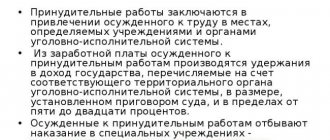Article 80 of the Criminal Code of the Russian Federation provides for the replacement of punishment (more precisely, the part that has not been served) with a more lenient type of punishment. Certain conditions that are prescribed in legislative acts must be met.
Multi-channel free hotline Legal advice on criminal law. Every day from 9.00 to 21.00
Moscow and region: +7 (495) 662-44-36
St. Petersburg: +7 (812) 449-43-40
Characteristic
The laws provide for the possibility of replacing part of the sentences not served by offenders. The measure in question extends its effect to persons who are sentenced to serve repressive measures, represented by forced labor, imprisonment, as well as being in military units that have a disciplinary bias.
The use of other measures of influence is permissible after a number of conditions are met, in particular:
- The court makes such a decision.
- The behavior of the convicted person must be taken into account. Pay attention to the entire period during which the convicted person served his sentence.
- The change is towards softening.
- The damage caused by the criminal act is compensated. This applies to both full and partial refunds.
- They will replace the part of the sentence that the person has not served.
It is worth paying attention to the fact that, according to Art. 80 of the Criminal Code of the Russian Federation, a criminal cannot be exempted from repressive provisions that have additional meaning. This applies to both full and partial exemption.
A separate category - acts directed against the sexual integrity of persons under the age of 18 - 3/4 of the time established by the competent authority has been served. If the victim in this category of cases has not reached the age of 14 years at the time of commission, then the period is equal to 4/5 of the total applied.
Replacement of punishment is carried out taking into account the provisions of the criminal law. In particular, Article 44 of the Criminal Code is taken into account. They can choose any type of sanctions that will be milder compared to what the person is already serving. The article in question, Article 80 of the Criminal Code of the Russian Federation, says that prisoners must submit a petition. It is addressed to the authorities that perform the functions of implementing educational measures or the administration of the institution where the offender is kept.
The person’s behavior will be taken into account, as well as how conscientious the attitude towards work is. An assessment is also given to the attitude of the offender towards the act he committed.
The unserved part of the sentence is replaced after the offender has served his share of the sanction. At the same time, each category of criminal acts has its own period. For example, if an act of minor or moderate gravity has been committed, then no less than 1/3 of the time specified in the sentence must be served. As for serious acts, the legislator establishes a requirement for serving 1/2 of the part, while for especially serious acts a period of 2/3 is prescribed.
Grounds for replacing the unserved part of the sentence with a more lenient punishment
The material basis for release is the behavior of the convicted person . One of the factors indicating positive changes in the behavior of the convicted person may be compensation for the harm (in whole or in part) caused by the crime. Therefore, the legislator sets compensation for harm as a mandatory condition for replacing the unserved part of the sentence with a more lenient one.
When assessing the behavior of a convicted person when considering the issue of replacing the unserved part of a sentence with a more lenient punishment, the court takes into account the behavior of the convicted person, his attitude to study and work during the entire period of serving the sentence, the attitude of the convicted person to the committed act and the fact that the convicted person partially or fully compensated for the damage caused. or otherwise make amends for the harm caused as a result of the crime. In relation to a convicted person suffering from a disorder of sexual preference (pedophilia), which does not preclude sanity, and who, at the age of over 18 years, has committed a crime against the sexual integrity of a minor under 14 years of age, the court also takes into account the application of compulsory medical measures to the convicted person, his attitude towards treatment and results of forensic psychiatric examination.
It is unacceptable to refuse to replace the unserved part of the sentence with a milder type of punishment on grounds not specified in the law, such as the presence of a previous criminal record, the leniency of the imposed punishment, the convict’s non-admission of guilt, the short duration of his stay in one of the correctional institutions, etc. Penalties imposed on the convicted person for the entire period of serving the sentence, taking into account the nature of the violations committed, are subject to assessment by the court in conjunction with other data characterizing it. At the same time, the presence or absence of a penalty on the convicted person cannot serve as either an obstacle or a basis for replacing the unserved part of the punishment with a more lenient type of punishment.
A comment
The Plenum of the Supreme Court, as well as the provisions of the criminal legislation, provide that, as grounds for releasing a person from being in correctional facilities, a measure is provided in the form of replacing the unserved term with a milder type of repressive measures. Application of this rule, in accordance with Part 1 of Art. 80 of the Criminal Code will be considered acceptable only in a situation where a number of conditions are met. These conditions are expressly stated in the law.
Before an official comes to a conclusion about the possibility of changing repressive measures, he analyzes several factors. This includes assessing how the applicable type of repression affected the convicted person. For example, his participation in work activity is taken into account, as well as his attitude towards it, etc. The entire period of a person’s stay in a correctional institution is taken into account, and not a specific time. It is also taken into account whether a person can become non-dangerous to society if a more lenient type of correctional provisions is assigned to him. In particular, these are fines, restrictions and other measures of influence.
The legislator indicates that depending on the severity of the act committed, the period that must be served by the offender will be calculated. In this case, attention is paid to the sanction of the article applicable to the criminals, as well as the established period. It is indicated that a more severe type of sanctions cannot be applied, only milder ones than those that are already being served.
The time of departure is established from the moment the court verdict came into force. Ends with the day the decision is made, according to which part of the period is replaced with a more lenient measure.
If a situation arises where the applied measure has already been mitigated by:
- amnesty act;
- court decision;
- decree of pardon.
In the resolution, when applying corrective measures for committing another offense, the share replaced by a mitigated version is not added.
This applies to those persons for whom repressive measures were replaced with mild ones. However, the part that has not been served is added. The following procedure for considering this issue is provided: the prisoner himself must draw up a petition for mitigation of measures of influence, after which he submits the document to the administration of the institution where he is being held. You can also visit with this request the authorities that perform correctional functions. The listed bodies send a resolution to the court to consider this issue. The procedure itself is regulated by current legislation.
The portion of the period that was actually served by the convicted person is subject to accounting. A similar principle applies in relation to the application of rules on parole. Part 2 of the commented article does not mean that the replacement is not automatic, that is, certain conditions must be met. The first thing the court pays attention to is whether there are any positive changes in a person’s behavior. In addition, it is important whether the convicted person will complete his correction if a more lenient measure is applied to him.
The commentary suggests that amendments were made to the law, according to which the provisions on replacing repressive measures with mild ones for offenders who have not reached the age of eighteen are no longer in force. These adjustments were made in 2001.
When a judicial body refuses to replace correctional measures with others, the date for a new consideration of this issue can be applied no earlier than six months from the date of this meeting. This rule applies to persons who are serving the specified measure in a disciplinary unit. If we are talking about deprivation of liberty, then a person can again apply for a mitigation of the sanction a year after this meeting.
The legal consultant explains that those positions have a softened educational impact; if you look at the code, in Article 44 they should be located one line higher than what the offender is already serving. The absence of a positive description of the perpetrator is the basis for the court to refuse to replace the unserved sentence with a commuted one.
When considering this issue, the judge is guided by rules that have general significance. They are established separately for all types of repressive measures. A petition is submitted at the place where the preventive measure is served. Article eighty-one of the Criminal Code provides for such a basis for exemption from educational provisions as illness; one can also talk about deferring the applicable provisions of the itr.
Petition to replace the unserved part of the sentence with a more lenient one
The convicted person himself, as well as his lawyer (legal representative), can apply to the court to replace the unserved part of the sentence with a more lenient one. The administration of the institution executing the sentence in which the convicted person is serving his sentence submits to the court a proposal to replace the unserved part of the sentence with a more lenient one.
The replacement of the unserved part of the sentence with a more lenient form is carried out by the court at the place of serving the sentence being replaced, upon the proposal of the institution or body executing it. At the same time, this provision does not prevent the convicted person from filing a petition with the court to replace the unserved part of the sentence with a more lenient one.
If the court refuses to replace the unserved part of the sentence with a milder type of punishment, the repeated submission of the corresponding petition or presentation to the court may take place no earlier than six months from the date of the court’s decision on refusal (Article 175 of the Penal Code of the Russian Federation).
Malicious evasion from serving the remainder of the sentence
If the sentence of imprisonment imposed on the convicted person was replaced in accordance with Art. 80 of the Criminal Code of the Russian Federation with a restriction of freedom, from serving which he maliciously avoided, the court, on the proposal of the Criminal Investigation Inspectorate, is considering the issue of replacing this punishment with imprisonment (Part 5 of Article 58 of the Penal Code of the Russian Federation).
If the convicted person maliciously evades serving the remaining part of the sentence, replaced by a milder type of punishment on the basis of Article 80 of the Criminal Code of the Russian Federation, the type of correctional institution is assigned to the one that was previously determined by the court verdict in accordance with Art. 58 of the Criminal Code of the Russian Federation, regardless of the type of correctional institution from which the convicted person was released.
Commentary to Art. 80 Criminal Code
1. The type of exemption from punishment under consideration is optional, i.e. the resolution of the issue depends on the discretion of the court. For its use, conditions and grounds must be present.
2. Conditions of application: the court has the right to replace only such basic types of punishment as detention in a disciplinary military unit, forced labor and imprisonment. In addition, the convicted person must fully or partially compensate for the damage caused.
A person may also be fully or partially released from any additional type of punishment if the additional punishment has not been executed by the time of replacement.
The unserved part of the sentence in the form of imprisonment can be replaced by a more lenient type of punishment only after the convicted person has actually served part of the sentence, which depends either on the category or on the type of crime (Part 2 of Article 80 of the Criminal Code). The law does not provide for such a condition for detention in a disciplinary military unit and forced labor.
3. Serving part of the imposed sentence allows the law enforcement officer to establish such positive changes in the behavior of the convicted person that indicate that for his further correction he no longer needs to fully serve the sentence imposed by the court, and it can be replaced with a more lenient one (grounds for application).
In relation to a convicted person suffering from a disorder of sexual preference (pedophilia), which does not exclude sanity, and who, at the age of over eighteen years, has committed a crime against the sexual integrity of a minor under fourteen years of age, the court also takes into account the application of compulsory medical measures to the convicted person, his attitude towards treatment and results of forensic psychiatric examination.
4. When replacing the unserved part of the sentence, the court may choose any milder type of punishment in accordance with the types of punishments provided for in Art. 44 of the Criminal Code. The choice of a specific type of punishment depends on whether it is possible to achieve with its help the goals of restoring social justice, correcting the convicted person and preventing the commission of new crimes. In this case, the court is guided by the terms or amounts established by the Criminal Code for each of the specified types of punishment.
5. The replacement of the unserved part of the punishment with a more lenient type of punishment is final.
6. If a person commits a new crime, the unserved part of the punishment that replaced detention in a disciplinary military unit, forced labor or imprisonment is added to the punishment imposed by the last sentence.
7. The replacement of the unserved part of the sentence with a milder form is carried out by the court at the place of serving the sentence being replaced, upon the proposal of the institution or body executing it. At the same time, this provision does not prevent the convicted person from filing a petition with the court to replace the unserved part of the sentence with a more lenient form (Determination of the Constitutional Court of the Russian Federation of October 20, 2005 N 388-O).








